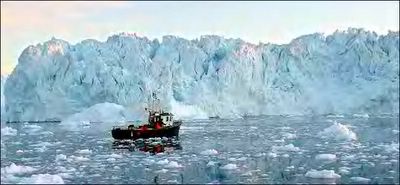

Here is a timeline on the science of climate change and the UN's Kyoto Protocol on global warming, which takes effect on Wednesday:
1827: French scientist Jean-Baptiste Fourier is first to consider the "greenhouse effect," the phenomenon whereby atmospheric gases trap solar energy, stoking Earth's surface temperature, rather than let the heat radiate back into space.
1896: Swedish chemist Svante Arrhenius blames the burning of fossil fuels (oil, gas and coal) for producing carbon dioxide (CO2).
1958: US scientist Charles David Keeling detects yearly rise in atmospheric CO2 as use of fossil fuels surges in post-World War II boom.
1970s: European and US scientists identify other gases (chlorofluorocarbons, methane, nitrous oxide) as greenhouse gases.
1979: Landmark report by US National Academy of Sciences pins greenhouse effect to climate change and warns "a wait-and-see policy may mean waiting until it is too late".
1988: Intergovernmental Panel on Climate Change (IPCC) is set up under UN auspices. Milestone in forging scientific consensus on how to measure and analyse global warming.
1992: UN Framework Convention on Climate Change (UNFCCC), popularly called the Rio Summit, calls for voluntary cuts in greenhouse-gas emissions.
1997: UNFCCC countries sign the Kyoto Protocol, which requires industrialised countries to reduce emissions of six greenhouse gases by 5.2 percent by a target of 2008-2012 compared with their 1990 levels. The protocol is a "framework". Fleshing out its complex and legally-binding rulebook is left to further negotiations.
2001 (Jan-March): The IPCC issues three reports, declaring the evidence for global warming to be incontrovertible although the consequences for the climate are difficult to pin down.
(March): United States, the biggest single CO2 polluter, abandons Kyoto. President George W. Bush questions the scientific evidence for global warming and says Kyoto is unfair and too expensive for the US economy.
(November): Kyoto signatories, minus the US, agree on the treaty's rulebook.
2002 onwards: Flurry of scientific studies fuels concern that global warming is accelerating, with dangerous and irreversible effects on the climate. Poor tropical countries will be affected most.
(April); US pressure forces out IPCC chairman Robert Watson, a leading scientist warning about climate change.
2003 (December): Insurance giant Munich Re puts the cost of climate-related disasters in 2003 at 60 billion dollars.
2004 (November): After several years' hesitation, Russia ratifies Kyoto. Its approval is needed to turn the draft pact into an international treaty under the arithmetic of its ratification clauses.
(December) The International Energy Agency (IEA) says China is now the world's second-biggest carbon polluter, due to surging use of fossil fuels to power its fast-growing economy.
2005 (February): Major conference of scientists in Exeter, England, determines that the climate is already being affected by global warming and that the potential consequences are worse than was previously thought.
February 16: Kyoto Protocol takes effect.
(November): Scheduled start of talks to negotiate the follow-on to Kyoto after 2012.